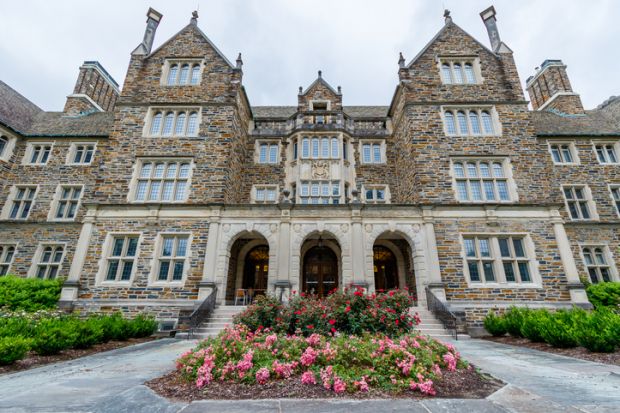A Duke University academic resigned from a graduate studies position after she helped two other staff members plan punitive action against students for speaking Chinese in a student study area.
Megan Neely, an assistant professor of biostatistics and bioinformatics, sent an email to all first- and second-year master’s students in her department complaining about several of them speaking Chinese “very loudly” in a lounge area.
In the email, Dr Neely tells the students that two other faculty members had reported the loud Chinese speakers to her. She writes that she then helped those faculty members review student photos to identify the Chinese speakers “so they could remember them if the students ever interviewed for an internship or asked to work with them for a master’s project”.
At a highly ranked institution where foreign countries led by China produce the overwhelming percentage of its graduate students in the sciences, Duke administrators took immediate action. The medical school dean apologised, accepted Dr Neely’s resignation from an administrative position and promised further investigation.
“Sadly, this matter demonstrates that we must continue to work on overcoming deep-seated concerns about our cultural awareness and understanding,” the medical school dean, Mary Klotman, wrote in a letter to the bioinformatics students.
In her email, Dr Neely writes in bold and underlined lettering that the two faculty members who came to her were “disappointed that these students were not taking the opportunity to improve their English and were being so impolite as to have a conversation that not everyone on the floor could understand”.
A group of Duke students quickly organised a petition complaining about the matter and calling for an investigation, saying there were “gravely concerned with the apparently discriminatory actions against international students”.
Shortly after that, Professor Klotman wrote her own note to the biostatistics master’s students, apologising for Dr Neely’s email and vowing that no retaliation against students for using foreign languages would be allowed.
Professor Klotman also promised that the university would study ways of improving the learning environment in the biostatistics programme for students of all backgrounds and announced Dr Neely’s resignation as director of graduate studies in that programme.
Duke and all of its units “respect the value of every student, every culture and every language that is spoken”, the dean wrote.
Professor Klotman’s statement did not identify the other two faculty members involved in the incident and did not address the possibility of additional punitive action involving them or Dr Neely.
The dean’s statement also made no mention of a similar email described in the student petition as having been sent to them by Dr Neely a year ago. In that message, the academic described faculty as being upset to see students meeting and eating in smaller private locations – outside the main dining and lounge areas – and talking in languages other than English.
Dr Neely warned the biostatistics students in that note last February that speaking non-English languages “may make it harder for you and future international students to get research opportunities” while in the programme. She also complained that the talking in such cases is sometimes “very loud” and therefore rude.
While Duke’s undergraduate class is overwhelmingly domestic students, its master’s degree programmes in the physical sciences and engineering are the opposite, with about 80 per cent foreign nationals, according a report a year ago in its student newspaper, The Chronicle.
In Duke’s graduate programmes, the top five countries that supply foreign students were China, India, South Korea, Canada and Italy, the report says.
The criticism of Chinese-speaking biostatistics students comes a month after Larry Moneta, Duke’s vice-president for student affairs, while visiting Duke Kunshan University near Shanghai, posted photos to Facebook mocking Chinese food and air quality.
Duke has invested tens of millions of dollars in Duke Kunshan University with the hope that it will lead to a surge in the number of Chinese students at its main campus in North Carolina.




